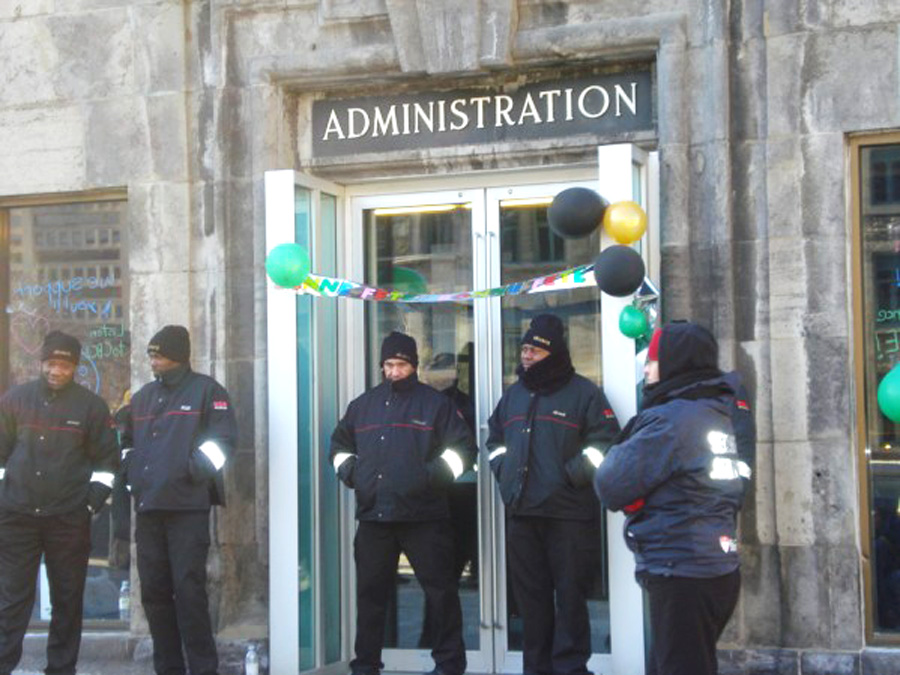Last Friday, Vice-Principal Administration and Finance Michael Di Grappa and Provost Anthony Masi released the first draft of a permanent Protocol, concerning demonstrations, assemblies, and protests on campus.
Members of the McGill community may submit comments and suggestions regarding the draft protocol to the administration until Jan. 7, 2013. Principal Heather Munroe-Blum has said this feedback will be integrated into a second version of the protocol, which will be presented to McGill Senate on Jan. 23, and to the Board of Governors on Jan. 29.
The draft’s release comes almost 10 months after the administration implemented a provisional protocol on Feb. 12, following a five-day student occupation of the sixth floor of the James Administration Building. The provisional protocol outlined parameters for how protests and similar activities may occur on university premises, and in what circumstances they would not be condoned and allowed to continue.
Critics of the original protocol condemned the document as vague and open to interpretation, and criticized the McGill administration for drafting it without any student consultation. Since then, the administration has been working to create a permanent protocol. This first draft of the new document was released Nov. 30.
“[The protocol] is intended to clarify how the right to freedom of expression and peaceful assembly on campus will be protected, while at the same time, safeguarding the rights of members of the community to carry out their normal activities,” Di Grappa and Masi wrote.
The draft protocol provides a definition of peaceful demonstrations and protests, and outlines seven conditions they must meet.
For example, the “intensity, intentionality, duration, and location” of demonstrations must be such that they allow McGill to maintain “a safe and secure environment” for its members, and permit the conduct of learning, teaching, and research. Protests are forbidden from occurring in classrooms, libraries, laboratories, private offices, or working spaces.
“If such activities go beyond the framework described in this protocol, or if demonstrators or protesters refuse to comply with instructions from Security Services personnel … appropriate actions will be taken, including calling civil authorities, if necessary,” the draft reads.
The protocol also emphasizes that “demonstrators, protestors and occupiers are responsible for their actions,” and that actions that breach the protocol could lead to disciplinary measures.
The draft protocol’s rules and conditions reveal few substantial changes from the February provisional protocol. However, the seven conditions in the draft have been reworded in a more affirmative tone.
In reaction to the new protocol, Students’ Society of McGill University (SSMU) President Josh Redel emphasized the need to balance the rights of students, such as the right to go to class, and the right to freedom of assembly.
“Nothing should violate those rights, but we also need to realize the importance of protests,” Redel said. “I worry that some of the language [in the protocol] might limit the power of protests, and hence some of the power community members have in this form of action.”
Redel encouraged students who desire change to comment on the draft protocol through the channels the administration has provided.
At its last Council meeting, the AUS voted to oppose the draft protocol in its current form.
Several campus labour unions, such as McGill’s Teaching Union (AGSEM), the McGill University Non-Academic Certified Association (MUNACA), and the Association for McGill University Support Employees (AMUSE) have openly condemned the new protocol.
“In its current form, the protocol conflates mere inconvenience with violent disruption, and therefore, tramples on the right of McGill community members to express all but the weakest forms of political dissent,” a statement on AGSEM’s homepage reads. “In doing so, the Protocol contravenes the Quebec Charter of Human Rights and Freedoms, which explicitly protects the freedom of all citizens to engage in principled, non-violent protest.”
“The protocol is restrictive on the rights of all employees on campus,” AMUSE President Jaime MacLean said. “Canada, Quebec, and the city of Montreal already have regulations in place for responding to demonstrations. There is no reason that McGill should take further measures.”
For those wishing to submit comments and suggestions regarding the draft protocol, the administration has created a confidential email address specifically for feedback: [email protected]








